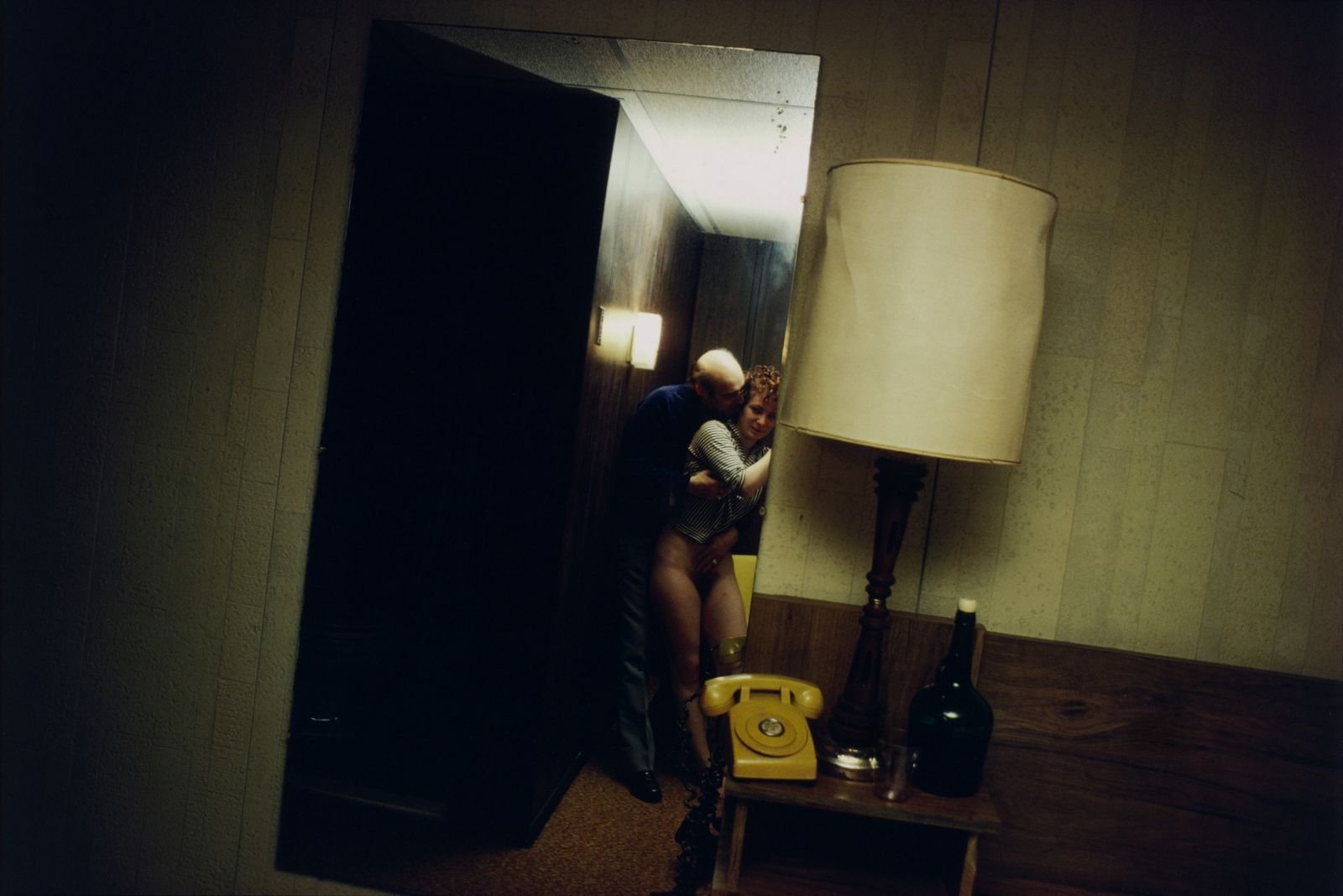The Ballad of Sexual Dependency
Act 3 from “SEX LULLABY- The Ethereal to be a Daily Chore”
The ballad of breaths. The dependency on smells and flavours of previously unknown layers, now familiar, in the prospect of being eternally foreign or internally embedded. Carnal. We gain control from the original loss of it, and as we gain it we become dependent on the sensation of its loss. The original sights grow to the point of being an exquisite breath of air. This is the purest conversation. Cowards associate a mischievousness that perhaps finds a better shelter in distant intimacy and fatal attraction. Are we cowards?
“Goldin’s Nan and Brian in Bed” - New York City, 1983
Scene 1
I put a spell on you to obsessively remember.
The ballad of sexual dependency may bring us back to the fear of the hypothetical insensitive observer. Through the explicit after we have already been eaten by a pair of starving prying eyes. The intelligence of the body and the distant attractiveness of distant intimacy are dismantled and become crudely sexual and real.
To sexually crave and be craved. I'm dying to communicate with you. My pleasure and my love are released by proclaiming themselves as defeated in a power struggle I have already lost. Winning, I am satisfied and almost wicked, but it's in fighting and losing that I am truly free. The gift of my power is the greatest form of love I have to offer. I donate my obsession with control - you offer me your stiff and clumsy integrity. You crumble and I coarsely laugh. A duel between losers. I step down from my pedestal, finally manifesting myself and unfolding my being.
A form of love: embarrassed, unaware, hungry and clumsy, seductive and soft. And why not, sometimes even functional? But we act in function of a form of love, which is unknown to us. We fear the irrationality that leads us away from our own identity. We want to stop it or alternatively define it, ending up picking out the curtains of our beautiful theatre, losing one of our favourite actors. The latter, more than the other person, could be us at our most free and vivacious version of the self. The glue of superbia was denial.
To love through communication is to accept the surrender of one’s identity, allowing physical boundaries to fade against one’s will, yearning to have never had them at all. Our ballad on our propensity of attachment to the sexual conversation.
Nan Goldin bites the public opinion with ‘The Ballad of Sexual Dependency’. She leaves a diary: “My desire is to preserve the sense of people’s lives, to endow them with the strength and beauty I see in them. I want the people in my pictures to stare back. I want to show exactly what my world looks like, without glamorization, without glorification. This is not a bleak world but one in which there is awareness of pain, a quality of introspection”.
Keeping a diary to impose a sort of control on actions and experiences, to obsessively remember and go over. The analysis of the nature of relationships: the biochemical reaction for which “even if relationships are destructive people cling together”. Love is an obsessive addiction, just like ‘heroin & chocolate’. Delicious.
“I have a strong desire to be independent, but at the same time a craving for the intensity that comes from interdependency”. Power game between possession of control and intense, vibrant pleasure. Which is the winning party? She formed a ballad through tension. A destructive energy between autonomy and dependency. Nan Goldin expresses the joke of mythology, guilty of defining love with dangerous expectations. Craving dependency, adoration, satisfaction, securitybut alsofeeling claustrophobic.
Our education, characterized by limitations of gender distinctions, leaves a significant mark on the way we relate to each other and in the roles we are supposed to inhabit. As we grow, we become aware that gender is a decision and not a status. Then, human beings can follow or play against roles by displaying their tenderness or toughness to contradict stereotypes.
Finally, sex is the “ultimate act of autonomy”. Sex itself is only one aspect of sexual dependency. That’s why photographs form the ballad. Pleasure becomes the motivation, but the real satisfaction is romantic. Bed becomes a forum in which struggles in a relationship are defused or intensified.
Fais-moi mal, Johnny
“The Ballad of Sexual Dependency” - Nan Goldin
Scene 2
Despite all the destruction, I could still crave that love. I had to face the irreconcilable loss.
The diary is dedicated to Barbara Holly Goldin, who committed suicide at a young age when the artist was eleven but already aware of the forces that were leading her sister: “I saw the role that her sexuality and its repression played in her destruction. Because of the times, the early sixties, women who were angry and sexual were frightening, outside the range of acceptable behavior, beyond control”.
For the artist, the following period was one of pain and loss; however, “In spite of the guilt I suffered, I was obsessed by my desire”, as she also was awakening to intense sexual excitement.
The artist fears men and women to be ‘irrevocably strangers to each other, also irreconcilably unsuited; speaking different emotional languages because they live different emotional realities’. Men grow with the social need to categorize because they fear women in the various roles we embody: mothers, whores, virgins and spider-women.
In many ways, Nan Goldin found her sister in herself, and for this feared, as her psychiatrist predicted, she would have died at eighteen too. Instead, at that age, she started to photograph, recording her experiences in detail: a day-to-day obsession. Sooner or later, she will realize the deeper roots of her obsession: not remembering “her presence, what her eyes looked like, what her voice sounded like”, the tangible sense of who her sister was.
“It's commonly said that this book is about 'marginalized' people. We were never marginalized. We were the world. We were our own world, and we couldn't have cared less about what 'straight' people thought of us. I made my people into superstars, and the Ballad maintains their legacy.
“In the '80s, there was a certain freedom, and a sense of immortality, that ended with that decade. AIDS cracked the earth. With everyone dying, everything shifted. Our history got cut off. We lost a whole generation. We didn't just lose the actors, we lost the audience. There are few people left with that kind of intensity. There was an attitude towards life that doesn't exist anymore, everything's been so cleaned up. Lately, when I'm working with the photos of my missing friends, it's as if they are frozen in amber. For long periods of time I forget they're not on this planet. But the pictures show me how much I've lost; the people who knew me the best, the people who carried my history, the people I grew up with and I was planning to get old with are gone. They took my memory with them. The pictures in the Ballad haven't changed. But Cookie is dead. David is dead. Greer is dead. Kenny is dead. I talk to them all the time, but they don't talk back anymore. Mourning doesn't end, it continues and it transmutes. This book is now a volume of loss, as well as a ballad of love.”
‘Nan Goldin, Rise and Monty Kissing” - New York, 1980
Scene 3
The good, the bad and the ugly.
Relationships are not a perfect science. To what extent am I perceptible to others? More importantly, to what extent can I reveal myself? How much do I unconsciously conceal? To what degree can you discern this hidden aspect of me? Sex is a language not everybody is able to translate, as we show and observe differently and from different points of view, based on the hypothetical life context we are facing.
What if I were a skilled seductress but a cowardly communicator? What if becoming aware of this and trying to modify my approach, I become less authentic?
What if I deceived you, presenting only spectral versions of myself, lacking any tangible reality—mere smoke and mirrors?
“What you know emotionally and what you crave sexually can be wildly contradictory. Sex isn’t about performance; it’s about a certain kind of communication founded on trust, exposure and vulnerability that can’t be expressed any other way. Intense sex bonds become consuming and self-perpetuating. You become dependent on the gratification. Sex becomes a microcosm of the relationship, the battleground, an exorcism”.
To the lovers I had, to those who tried to ruin this form of communication and to those who helped me restore it without knowing. To my future exchanges of energies.
To those who were satisfied with hearing me breathe, to those who noticed me and to those who failed at the latter, but shared a moment with a version of me that doesn’t exist anymore. Because they lived it with me in that moment and they contribute to my memory and to the way I silently communicate through sex and through simple gestures of life.
To those I was satisfied with hearing them breathing, and to those who secretly shared their fears and desires by only looking at me for a few seconds. Some of you could actually see me. From some other of you, I was simply hiding. Both with or without the desire to be unmasked. Some of you were blind and with some others, I was seeking blindness too.
Don’t let them ruin your ability to communicate.
You are your own way of loving and silently breathing.
Breathe solo, breathe with other bodies or other souls. Breathe for you. For different purposes.
Experiencing life through forms of breathing.
‘I don’t ever want to be susceptible to anyone else’s version of my history. I don’t ever want to lose the real memory of anyone again’
“Bruce on Top of French Chris” - Fire Island, New York, 1979




